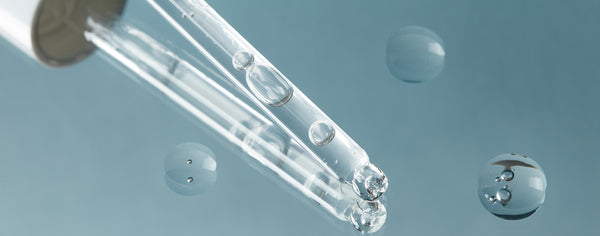Fermentation and Skincare

Wine, cheese and skincare—what do these three things have in common besides an indulgent self-care Sunday ritual? Fermentation.
Fermentation is a process in which complex biological compounds are broken down through enzymatic action, facilitated by a controlled microbial growth (usually by yeast, fungi or bacteria). Fermentation can enhance the taste of drinks like that bottle of rosé, alter the flavour and texture of dairy products and enhance the health benefits of something as simple as tea giving us kombucha or food like in kimchi. Still, what does this have to do with your daily skincare ritual? A lot.
In the context of cosmetics, fermented ingredients present numerous, published potential benefits. Employed in the industry for decades, fermented skincare has arguably originated and was popularized by Asian brands.
So, how does this work for your cleanser, moisturizer or serum? Ingredients such as rice bran1–3, green tea4, milk5, ginseng6,7, soy8,9 and lavender10 all have documented benefits for the skin, but imagine if you can supercharge these benefits by making these ingredients into something special—fermentation can do this.
Natural products such as those mentioned above are fermented in a controlled environment in the presence of specific “friendly” bacteria (like Bifidobacterium, Streptococcus, Lactobacillus and Lactococcus), fungi (like Aspergillus) or yeast (like Saccharomyces). After some time, the fermented material (or culture) is processed in a way to inactivate any living microorganism (such as through heat, filtration or sonication) while retaining all the fermented goodness to be used in a cosmetic formula.
You may often see products marketed with terms like “probiotic” or “postbiotic,” and chances are, they contain fermented ingredients. There’s a misconception that such products contain living microorganisms but that is not the case. If you take a look at the ingredients list and see any of the names of the organisms above or the words, “lysate” or “ferment,” then you have yourself fermented skincare. In some cases, an ingredient list may even have what the raw product was and how it was fermented—for example, “SACCHAROMYCES/RICE FERMENT FILTRATE” is found in many skincare products and suggests that rice bran was fermented by the bacterium, Saccharomyces.
Fermented skincare in action
Now that we know what fermentation is and how it applies to skincare, is there any real benefit to fermented ingredients? The short answer—yes; the long answer—it depends, as more conclusive data is needed.
Like many cosmetics, published research regarding efficacy is limited. That said, fermented ingredients have a surprising catalogue of sound data with human, and in vivo models. One of the hallmarks of fermenting ingredients is to breakdown these complex organic compounds and increase either their bioavailability to the skin, availability of beneficial compounds, enhancement of the antioxidant profile and improved cosmetic elegance.
One ingredient that has been widely adopted in cosmetics is fermented rice bran. Rice bran is often discarded as agricultural waste from rice processing, but it is well known that fermentation of this by-product changes the biochemical properties2,11–13. Fermentation allows for the breakdown of the otherwise indigestible cell wall of rice bran, releasing or synthesizing a variety of bioactive compounds such as plant phenols, enzymes and organic acids. Further to this, fermentation also improves the antioxidant profile of rice bran—enzymes such as β-glucosidase, produced by the fungi, liberates free phenolics such as ferulic and sinapic acid from rice bran during fermentation2,12. Other studies have also demonstrated great potential of fermented rice bran in addressing the signs of ageing due to the increased availability of syringic acid which is an effective elastase (enzymes which degrades elastin) inhibitor as well as kojic and protocatechuic acids, which are strong tyrosinase (enzyme responsible for hyperpigmentation) inhibitors2,14,15.
Studies have pointed to the fermentation of soy milk by Bifidobacterium in stimulating hyaluronic acid in human skin cells. The bacterium releases two critical compounds from raw soy called genistein and diadzein, which are known for stimulating hyaluronic acid synthesis9. A ferment of Saccharomyces demonstrated anti-inflammatory properties in vivo, which could be due its function as a prebiotic to modulate and promote probiotic strains present on our skin to produce essential fatty acids16,17.
It’s clear that ferments have quite a bit of potential when it comes to improving the appearance and health of our skin, but what else can fermentation do? It can improve cosmetic elegance while also increasing nutritional profiles. In the case of Camellia oil, an antioxidant rich plant oil, bacteria break down the oil through the synthesis of enzymes lending to a product that only has an improved antioxidant profile but one that is less greasy, easier to rinse and emulsify making it ideally suited for a first-cleanse experience.
Ferments—where do they stand?
While being eco-friendly by reducing waste, fermentation has the distinct ability to increase the bioavailability of key compounds for your skin, enhancing the antioxidant potential of botanicals, encouraging the growth of probiotics as well as improving the appearance and health of your skin, it is clear that ferments present numerous and documented benefits that even extend to the improvement in cosmetic elegance of ingredients.
Can your routine rest alone on ferments? These biocompatible and well-tolerated ingredients make a great addition to any routine. Ferments support an existing routine through the provision of enhanced antioxidant support and key bioactive compounds to improve overall skin health and condition.

SOURCES:
- 1Saba E, Lee CH, Jeong DH, et al. Fermented rice bran prevents atopic dermatitis in DNCB-treated NC/Nga mice. J Biomed Res. 2016;30(4):334-343. doi:10.7555/JBR.30.2016K0001
- 2Abd Razak DL, Abd Rashid NY, Jamaluddin A, Sharifudin SA, Abd Kahar A, Long K. Cosmeceutical potentials and bioactive compounds of rice bran fermented with single and mix culture of Aspergillus oryzae and Rhizopus oryzae. J Saudi Soc Agric Sci. 2017;16(2):127-134. doi:10.1016/j.jssas.2015.04.001
- 3Chen LH, Chen IC, Chen PY, Huang PH. Efficacy of rice bran fermentation in cosmetics and skin care products. Biosci J. 2018;34(4):1102-1113. doi:10.14393/BJ-v34n1a2018-39976
- ...
- 4Koch W, Zagórska J, Marzec Z, Kukula-Koch W. Applications of tea (Camellia sinensis) and its active constituents in cosmetics. Molecules. 2019;24(23):1-28. doi:10.3390/molecules24234277
- 5Rong J, Shan C, Liu S, et al. Skin resistance to UVB-induced oxidative stress and hyperpigmentation by the topical use of Lactobacillus helveticus NS8-fermented milk supernatant. J Appl Microbiol. 2017;123(2):511-523. doi:10.1111/jam.13506
- 6Lee HS, Kim MR, Park Y, et al. Fermenting Red Ginseng Enhances Its Safety and Efficacy as a Novel Skin Care Anti-Aging Ingredient: In Vitro and Animal Study. J Med Food. 2012;15(11):1015-1023. doi:10.1089/jmf.2012.2187
- 7Park JJ, An J, Lee JD, et al. Effects of anti-wrinkle and skin-whitening fermented black ginseng on human subjects and underlying mechanism of action. J Toxicol Environ Heal - Part A Curr Issues. 2020;83(11-12):423-437. doi:10.1080/15287394.2020.1776454
- 8Lee S, Kim JE, Suk S, et al. A fermented barley and soybean formula enhances skin hydration. J Clin Biochem Nutr. 2015;57(2):156-163. doi:10.3164/JCBN.15-43
- 9Miyazaki K, Hanamizu T, Iizuka R, Chiba K. Bifidobacterium-fermented soy milk extract stimulates hyaluronic acid production in human skin cells and hairless mouse skin. Skin Pharmacol Appl Skin Physiol. 2003;16(2):108-116. doi:10.1159/000069031
- 10Ha JH, Rang Kim A, Lee KS, et al. Anti-Aging activity of lavandula angustifolia extract fermented with pediococcus pentosaceus DK1 isolated from diospyros kaki fruit in UVB-irradiated human skin fibroblasts and analysis of principal components. J Microbiol Biotechnol. 2019;29(1):21-29. doi:10.4014/jmb.1809.09037
- 11Pourali O, Asghari FS, Yoshida H. Production of phenolic compounds from rice bran biomass under subcritical water conditions. Chem Eng J. 2010;160(1):259-266. doi:https://doi.org/10.1016/j.cej.2010.02.057
- 12Katina K, Laitila A, Juvonen R, et al. Bran fermentation as a means to enhance technological properties and bioactivity of rye. Food Microbiol. 2007;24(2):175-186. doi:https://doi.org/10.1016/j.fm.2006.07.012
- 13Katina K, Liukkonen K-H, Kaukovirta-Norja A, et al. Fermentation-induced changes in the nutritional value of native or germinated rye. J Cereal Sci. 2007;46(3):348-355. doi:https://doi.org/10.1016/j.jcs.2007.07.006
- 14Mukherjee PK, Maity N, Nema NK, Sarkar BK. Bioactive compounds from natural resources against skin aging. Phytomedicine. 2011;19(1):64-73. doi:10.1016/j.phymed.2011.10.003
- 15Miyazawa M, Oshima T, Koshio K, Itsuzaki Y, Anzai J. Tyrosinase Inhibitor from Black Rice Bran. J Agric Food Chem. 2003;51(24):6953-6956. doi:10.1021/jf030388s
- 16Jensen GS, Carter SG, Reeves SG, Robinson LE, Benson KF. Anti-inflammatory properties of a dried fermentate in vitro and in vivo. J Med Food. 2015;18(3):378-384. doi:10.1089/jmf.2013.0158
- 17Evans M, Reeves S, Robinson LE. A dried yeast fermentate prevents and reduces inflammation in two separate experimental immune models. Evidence-based Complement Altern Med. 2012;2012. doi:10.1155/2012/973041






